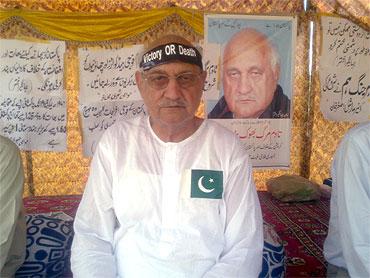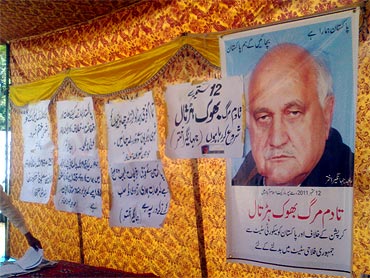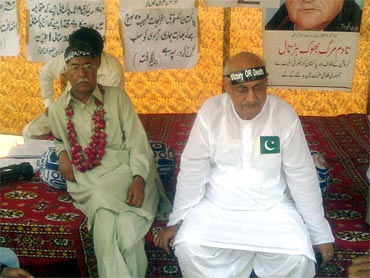
India and Pakistan both share the dubious distinction of suffering from the debilitating problem of corruption. This menace has not only crippled Pakistan's economy but also hampered all kinds of developmental activities in the country.
India recently witnessed a massive movement against corruption, led by activist Anna Hazare and supported by thousands of Indians.
In sharp contrast, Pakistan's citizens are currently in a state of despair about the scourge of corruption, says anti-graft activist Raja Jahangir Akhtar.
Influenced by Hazare's fight against corruption, the 68-year-old social activist has also started an anti-corruption movement in Pakistan. He has declared a war on graft and has been on an indefinite hunger strike since Monday in Islamabad.
In an interview with Tahir Ali, Raja Jahangir says that he is determined to mobilise the masses against corruption.

What is the aim of your movement?
I have waged a battle for the past 48 years to bring about positive changes to the poor economic situation in Pakistan. For my candid views on the country's economy, I was put behind bars many times. A military court even awarded me a jail term of one year, but I never surrendered and continued my struggle.
Although fighting corruption was not my first priority, I decided to bring an end the burgeoning corruption in Pakistan after witnessing the successful anti-graft movement led by Indian social activist Anne Hazare.
Do you think the present political leadership is responsible for the economic crisis?
I am totally disappointed about Pakistan's acute economic crisis. The pathetic and insensitive attitude of the political leadership about this grave economic situation is more disappointing. I have kicked off the movement as a protest against the present political leadership.
Why has corruption flourished so much in Pakistan?
Corruption is bound to flourish in a culture that encourages the display of affluence without any regard about how the wealth has been obtained. Lack of accountability plays a crucial role in the promotion of bribery and resistance to any form of reform.

How long will you continue your hunger strike and how hopeful are you about the success of your struggle?
We are striving to pass an anti-corruption law in Parliament. I am currently on a hunger strike and soon other people will also join me. If the government doesn't pay heed to our demand of fighting corruption, I will continue the hunger strike until my death. It is a very difficult job to mobilise Pakistan's masses but I am hopeful that one day they will support me.
Anne Hazare mobilised thousands of people in India while your supporters are few; what do you think is the reason for this?
In Pakistan, people live in a state of despair as they believe that no one can change the current situation. They have lost all hope about corruption ever being eradicated. The people of India don't think that corruption has gone beyond control and corrupt elements can't be eliminated. That's why they are supporting Anne Hazare.
At the same time, the Indian Parliament understood their sentiments and adopted a resolution. But in Pakistan, there is no section of the administration untouched by the corruption, so there is no consensus on the accountability bill.
Is there any solution to resolve the current economic crisis of Pakistan?
My suggestion is that we can salvage our economy by cutting down the size of our army, as we don't have any external threats at the moment. Another way to meet our economic challenges is to end our confrontations with India and Afghanistan.